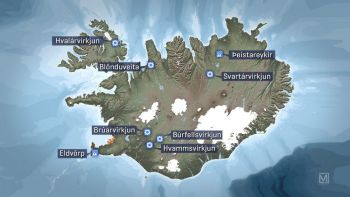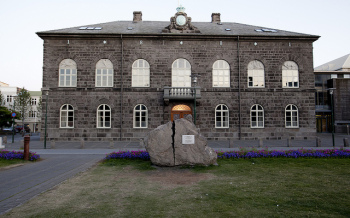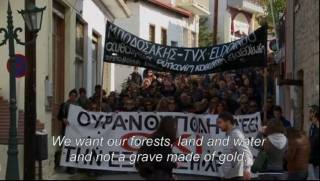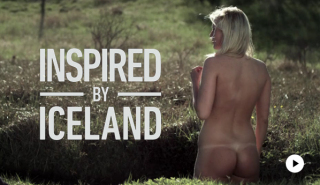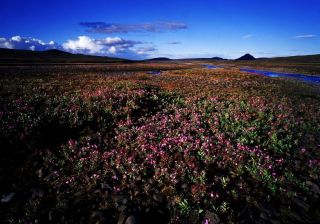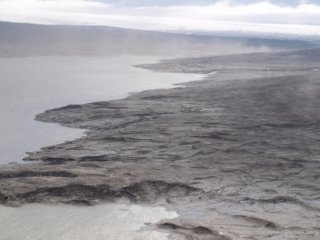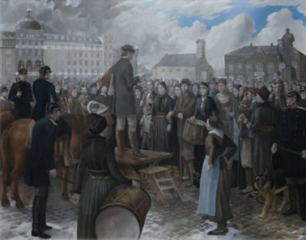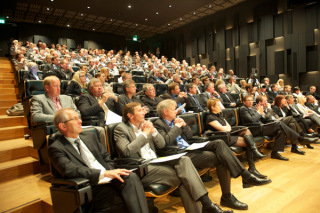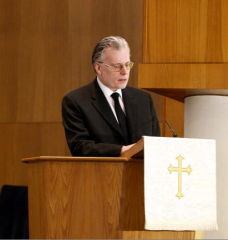'Media bias'
Tag Archive
Aug 07 2017
6 Comments
ALCOA, Climate Change, Dams, Ecology, Geothermal Cluster, Geothermal Energy, Greenwash, hydropower, Kárahnjúkar, Media bias, Pollution, Saving Iceland, Tourism
Michael Chapman
When it comes to loving where you’re from, Iceland has a fantastic international reputation for its widespread use of renewable energy, its untouched landscapes and its sustainable environmental policies. But just how true is Iceland’s positive attitude to the environment?
How are phenomena such as climate change, heavy industry and tourism affecting the landscape, the wildlands, the glaciers and the seasons of the country? Most importantly, how are the Icelandic people responding to these threats, if at all?
There can be no denying, nor any hope of denying, Iceland’s staggering aesthetic beauty. Icelanders themselves are quick to point out their spiritual connection to the land, understandably proud and protective of their country’s many highlights; its geological marvels, breathtaking panoramas and stunning natural scenery.
With rolling black sand beaches, mist-wreathed mountainscapes, cerulean glacier tongues and bubbling hot springs, Mother Nature has candidly outshone herself decorating this small, Atlantic island. Read More
Dec 07 2016
Economic Collapse, Media bias, Neo-Liberalism
Árni Daníel Júlíusson
Iceland’s recent general election shows that the country’s neoliberal consensus is over. What happens next?
When the Icelandic parliament assembled in fall of 2010, tens of thousands gathered to throw eggs and rotten tomatoes at the politicians. The MPs were participating in a traditional march between the cathedral and the parliament building that marks the beginning of each legislative setting. Protesters repeated their performance exactly a year later, now with an even larger crowd.
These events marked the midpoint of Iceland’s anti-neoliberal rebellion, which had started in the fall of 2008 at the time of the financial collapse. The mass actions represented a definitive break with the neoliberal consensus the country had sustained since 1984. Read More
Jan 30 2014
1 Comment
Corruption, Democracy deficit, Ecology, Eldorado Gold, Goldmine, Greece, Media bias, Mining, Platina Resources, Repression, Skouries
How a mining conflict led to the political emancipation of a community in Northern Greece.
By Evi Papada
Occupied London – From the Greek Streets
Mining conflicts are increasingly surfacing globally due to complains over mines and pollution of water, soil and land occupied as well as over transport and waste disposal. The
Skouries forest in Halkidiki has been at the center of a hot dispute between the mining company, Hellas Gold, a subsidiary of the Canadian mining giant
Eldorado Gold and local communities. The company claims that an ambitious plan for mining of gold and copper in the area- including deforestation and open pit mining with excavation and everyday use of explosives- will benefit the region through the creation of some 5,000 direct and indirect jobs, while local residents argue that the planned investment will cause considerable damage to the environment and livelihoods, resulting to many more jobs losses in the existing sectors of the local economy (farming, pasture land, fisheries, beekeeping, food processing and tourism). The residents’ claims are supported by research conducted by various independent scientific institutions including the Aristotle University of Thessaloniki and the Technical Chamber of Macedonia. In addition to legitimacy questions underpinning the transfer of mining rights from the Greek state to the aforementioned company
[1], the Environmental Impact Assessment produced by
El Dorado has been found to contain gross methodological discrepancies and whilst the public consultation process could be at best described as cosmetic
[2]. Read More
Oct 28 2013
Corruption, Democracy deficit, Economic Collapse, IMF, Media bias, Repression
By Haukur Már Helgason
After being hailed as the world’s radical wunderkind for a few years, Iceland left observers perplexed when the parties evidently responsible for its failed neoliberal experiment were voted back in 2013. Who or what runs this shop, really?
You “want to move outside the herd and be independent” because you are “different from the ‘ordinary’ tourist.” You “have above average education” and you “have above average income,” says the Icelandic Tourist Industry Association’s report from last year, defining their target group, ‘the enlightened tourist.’ And boy, are you targeted. Read More
May 06 2012
Laws, Mark Kennedy, Media bias, Police, Repression, Saving Iceland
By Snorri Páll Jónsson Úlfhildarson, originally published in The Reykjavík Grapevine.
This simply means that until spring last year, the police literally had a carte blanche regarding whom to spy on and for whatever reasons they chose. Unbeknownst the public, the instructions allowed unrestricted espionage.
“Good things happen slowly,” Björn Bjarnason, Iceland’s former Minister of Justice, wrote on his blog in March of last year when his successor in office, Minister of the Interior Ögmundur Jónasson, called for a press conference to announce that the police would soon be granted proactive investigation powers.
While Ögmundur and other Left Green MPs often criticised Björn for his aggressive efforts to increase police powers during the latter’s six years in office, he is now advocating for increased police powers as part of The State’s crusade against purported organised crime, which is believed to be predominantly manifested in a number of motorcycle gangs, including the Hells Angels.
A bill that he proposed to parliament last month does not contain the infinite investigation powers that the police have openly asked for, but does nevertheless allow them to start investigating people who they believe are planning acts that would fall under the category of organised crime and are punishable by at least four years of imprisonment.
While the case is usually presented as the police’s struggle to gain greater justifiable investigative powers — in which they have supposedly not fully succeeded — the fact is that, from at least July 1999 to May 2011, the police had unrestricted authority to monitor whomever they wanted due to poorly defined regulations. Read More
Dec 09 2011
4 Comments
ALCOA, Century Aluminum, Corruption, Dams, Democracy deficit, Ecology, Economic Collapse, Economics, Helguvík, Impregilo, Jaap Krater, Kárahnjúkar, Landsvirkjun, Media bias, Reykjavik Energy
The profitability of Landsvirkjun, Iceland’s national energy company, is way too low. And worst off is the Kárahnjúkar hydro power plant, Europe’s largest dam, the company’s biggest and most expensive construction. Landsvirkjun’s director Hörður Arnarson revealed this during the company’s recent autumn meeting, and blamed the low price of energy sold to large-scale energy consumers, such as Alcoa’s aluminium smelter in Reyðarfjörður, as one of the biggest factors reducing profit.
These news echo the many warnings made by the opponents of the cluster of five dams at Kárahnjúkar and nearby Eyjabakkar, who repeatedly stated that the project’s alleged profitability was nothing but an illusion, but were systematically silenced by Iceland’s authorities.
Now, as these facts finally become established in the media—this time straight from the horse’s mouth—similarly bad news has arrived regarding another big Icelandic energy company. Reykjavík Energy has failed to make a profit from their 2007 and 2008 investments, effectively making them lose money.
At the same time, new research shows that the environmental impacts of the Kárahnjúkar dams are exactly as vast and serious as environmentalists and scientists feared.
And yet, more dams, geothermal power-plants and aluminium smelters are on the drawing table—presented as the only viable way out of the current economic crisis. Read More
Nov 05 2011
2 Comments
ALCOA, Century Aluminum, Landsvirkjun, Media bias, Reykjavik Energy, Rio Tinto Alcan, Samál (the Icelandic Association of Aluminium Producers)
By Snorri Páll Jónsson Úlfhildarson, originally published in The Reykjavík Grapevine.
Those who are yet to give up on Icelandic media cannot have avoided noticing one Kristján Már Unnarsson, a news director and journalist at TV station Stöð 2. Kristján, who in 2007 received the Icelandic Press Awards for his coverage of “everyday countryside life”, is a peculiar fan of manful and mighty constructions and loves to tell good news to and about all the “good heavy industry guys” that Iceland has to offer.
To be more precise, Kristján has, for at least a decade (and I say “at least” just because my memory and research doesn’t take me further back), gone on a rampage each and every time he gets the chance to tell his audience about the newest of news in Iceland’s heavy industry and energy affairs. He talks about gold-mills when referring to dams built to power aluminium production; and when preparing an evening news item on, say, plans regarding energy and aluminium production, he usually doesn’t see a reason for talking to more than one person – a person who, almost without exception, is in favour of whatever project is being discussed.
After witnessing Kristján’s latest contribution to the ongoing development of heavy industry and large-scale energy production, i.e. his coverage of Alcoa’s recently announced decision not to continue with its plan of building a new aluminium smelter in Húsavík, wherein he managed to blame just anything but Alcoa itself for the company’s decisions, I couldn’t resist asking (and, really, not for the first time): What can really explain this way too obvious one-sidedness, manifest not only in this one journalist’s work but seemingly the majority of news coverage concerning heavy industry? Read More
Oct 07 2011
Democracy deficit, Economic Collapse, Media bias, Neo-Liberalism, Saving Iceland
Árni Daníel Júlíusson
It is funny how things can turn around. For decades, Iceland languished in neoliberal hell, with signs of opposition few and far between. Meanwhile the opposition to the neoliberal order of things grew all over the world—with massive protests in Seattle, Genoa and elsewhere—and the beginnings of a world-wide anti-globalisation movement represented by the World Social Forum, first held in Porto Alegre, Brazil, in 2001. Almost nobody in Iceland did or said anything to support these powerful movements against the neoliberal order, with the exception of the brave Saving Iceland organisation. Read More
Jun 29 2011
2 Comments
ALCOA, Alterra Power/Magma Energy, Century Aluminum, Corruption, Economic Collapse, Geothermal Cluster, Geothermal Energy, Greenwash, H.S. Orka, Helguvík, Landsvirkjun, Media bias, Reykjavik Energy
Dozens of Icelandic companies and institutions, all directly connected to the heavy industrialization of Iceland, have established a co-operating forum concerning the development of the so-called “Icelandic geothermal cluster”. The forum, which was formally established yesterday, June 28th, is originally a conception by Dr. Michael Porter, professor at Harvard Business School and known as “a leading authority on company strategy and the competitiveness of nations and regions.” Interviewed by a news-report TV show Kastljós, Porter, who was in Iceland to take part in the forum’s formal establishment, said that Icelanders are “too cautious” when it comes to “using the opportunities that consist in geothermal energy and the nation’s expertise on the issue.” Contrary to Porter, environmentalists and
Iceland’s National Energy Authority fear the overexploitation of geothermal resources. Read More
May 20 2011
5 Comments
Corruption, Democracy deficit, Laws, Mark Kennedy, Media bias, Ólafur Páll Sigurdsson, Repression, Saving Iceland
Statement from Saving Iceland regarding the recently published report by the National Commissioner’s ‘National Security Unit’. The report was requested by the Minister of the Interior and was supposed to answer the questions if the Icelandic police were aware of and collaborated in British police spy Mark Kennedy’s infiltration of the Saving Iceland network. (Translated from Icelandic.)
The Saving Iceland network has spent some time examining the report authored by the National Commissioner’s ‘National Security Unit’ published on May 17. Already at this stage we would like to make a considerable number of remarks.
First of all we have to express our astonishment if Ögmundur Jónasson, the Minister of the Interior is going to accept as valid the poorly reasoned cover-ups that are resorted to by the report’s authors. It is also remarkable how superficial and simply untrue the Minister’s own interpretation of the report has been so far. Unfortunately the same is true of the coverage of the report made by some of the Icelandic corporate media.
The report’s most serious flaw is of course the fact that it completely evades the responsibility that it was officially intended to assume. The only de facto information about the report’s actual subject is on page 12, where it is stated that the police received “confidential information” concerning the intended protests against the Kárahnjúkar dam from both domestic and foreign “informers”, and that this information was used to organize the police’s reaction. Read More
